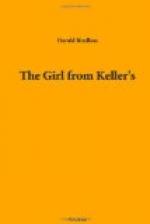“I’ve not seen this kind of fastening before,” he said. “It ought to grip well, but something depends upon the wedge.”
Kerr nodded. “The wedge must be properly forged and fit tight, but there’s a cross bolt to stop it backing out. So long as it doesn’t break under the hammer, it can’t come loose. Something depends on the way the hole is cut and the rock, but the stuff you’re working is hard enough.”
Next morning Charnock took the drawing to the smith, and calling at the forge a day or two later, found Wilkinson sitting on a box. He had brought a pick to be mended and made a few ironical remarks, until the smith showed Charnock some irons he had forged.
“I guess that’s what you want, but I haven’t finished the Lewis yet. Reckoned I’d wait until I could get a bit of horseshoe iron for the wedge when the new stores come along.”
“What’s that bar in the corner?” Charnock asked.
“Steel,” said the smith. “A bit off the end would make a wedge, but you want to be careful you don’t overheat the steel in the forge if it’s to stand hammering after. Horseshoe iron’s better for your particular job. Come back in a day or two and I’ll have the thing ready.”
Charnock left him and one afternoon soon afterwards helped Festing to notch and bore the heavy cross-tie to fit the post and the ends of the timbers it was to hold in place. These were intended to strengthen the frame, of which the post and tie were the most important members, and Festing had waited until their other ends were securely fixed. When the light was fading he beckoned Charnock.
“You might get the Lewis bolt. The smith sent word it’s ready and I want to fasten the tie before we stop.”
When Charnock reached the forge the smith was absent, but he blew the fire until the light flickered about the shop and looked for the bolt. He found it in a corner and took the wedge to the hearth. It was properly shaped and slotted for a cross-bolt, but it looked rough and scaly, and giving the blower a few more strokes he tapped it once or twice. The scale fell off and the metal looked sound. Then while the flame spread about the fuel he glanced round the shop. There was no horseshoe iron, but the bar of steel had recently been cut, and he thought the wedge had been forged out of its end.
Charnock did not think this mattered much. Festing had urged the smith to finish the job, and the man knew his business. Since he had been forced to use steel, he had no doubt taken the necessary precautions. It was dark when Charnock got back to the frame, but a blast-lamp threw out a dazzling glare and he climbed to a beam on which Festing sat. At the timber’s inner end a fire burned on a shelf of rock and a man was stirring something in an iron pot.
“We’re melting lead to fill up the hole, though I don’t know if it’s necessary,” Festing said. “Have you got the bolt?”
“It’s here. He has made it out of steel; the iron he expected hasn’t arrived.”




